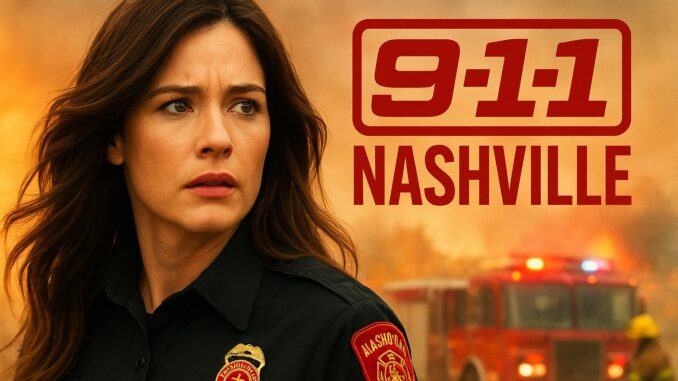
Introduction – A Big Premiere, A Bigger Disappointment?
Per a report from Programming Insider, 9-1-1: Nashville debuted with 3.718 million same-day viewers on Thursday, October 9, and scored a 0.29 Nielsen rating in the 18-49 demographic. Meanwhile, 9-1-1 season 9’s premiere garnered 4.187 million viewers and a 0.35 rating. As one can see, the spinoff failed to retain the flagship show’s numbers, which is a bit shocking.
It appears some 9-1-1 fans aren’t all that eager to watch the offshoot, despite it conveniently airing after the original series. It just isn’t appealing to them. The 9-1-1: Nashville premiere’s initial numbers are nothing to write home about on their own. Yes, network TV’s ratings have significantly slumped overall in recent years, but a 0.29 Nielsen debut is still disappointing.
9-1-1: Nashville’s still in its early days, but this is when ABC must do whatever it takes to prove that it’s worth watching. Thankfully, there’s one easy way to do so. All ABC has to do is implement a popular network TV trend that is all but guaranteed to entice established 9-1-1 fans to watch the offshoot, as well as draw in new viewers.
9-1-1: Nashville serves as the second spinoff in the 9-1-1 franchise, following in the footsteps of the recently canceled 9-1-1: Lone Star. As its title reveals, the procedural drama is set in Nashville, Tennessee. It follows Station 113’s first responders and their families, along with all the intense and soap-opera-like drama that unfolds. Unfortunately, that hasn’t been enough to lure viewers.
When you launch a new show under the banner of a successful franchise, the expectations are sky-high. That’s precisely what happened with 9-1-1: Nashville, the latest spin-off of the popular 9-1-1 universe. But despite the built-in audience and franchise pedigree, the show’s initial ratings and reviews are sending up warning flags. Let’s dive into why it’s not quite landing the way the network hoped.
Franchise Power & Spin-Off Hype
Franchises often carry weight—they bring built-in fans, brand recognition and a feel of “you’ll know what you’re getting”.
In this case:
-
The original show, 9-1-1, has established a loyal following.
-
The spin-off selection of Nashville was a strategic move: high visibility, cultural backdrop, and production incentives.
So on paper: franchise + familiarity + location = recipe for success. But real world? Not so much.
The Ratings Snapshot – “Underwhelming” by the Numbers
Let’s look at some early signals:
-
According to a user-rating site, several viewers already gave the show 0.5 or 1 out of 5, calling storylines “over the top” or “unbelievable”.
-
Web forums and Reddit indicate viewership is lower compared to previous franchise entries. One user commented:
“A season premiere episode being a series low?? That’s…not good lmao.”
-
While official live-plus-7 day numbers aren’t yet fully public, by all reports the show is starting from a weaker place than the network probably hoped.
In short: the numbers are there, and they’re not showing dominance—they are showing concern.
Review Aggregator Feedback – What Critics Are Saying
Critics haven’t exactly been singing praises:
-
On one review aggregator site, early audience comments are brutal—lots of mentions of “weak writing”, “unlikeable characters”, “phony realism.”
-
Sites like Decider are more generous, with a “stream it or skip it?” take and an acknowledgement of the show’s “ridiculousness” as part of its charm—though that’s not the strongest endorsement.
So: the critical consensus is mixed-to-negative, leaning closer to negative.
Why Are Ratings & Reviews So Weak?
There’s no single “magic bullet”, but several contributing factors:
Expectation vs Reality
Because the original 9-1-1 franchise delivered adrenaline-filled emergencies and dramatic personal stakes, viewers assumed Nashville would follow suit. But from the reviews, many feel the execution misses the mark—scenes feel forced, characters less relatable, dramas more contrived.
Setting & Tone Clashes
Nashville has its own history and cultural identity: country music, Southern charm, tourism. Integrating this into a high-stakes first-responder procedural is compelling on paper, but critics suggest the blending doesn’t feel seamless yet. It seems to oscillate between “drama” and “soap opera”.
Character Introduction Overload
Spin-offs often need to establish new characters quickly. Nashville introduces multiple arcs: firefighters, dispatchers, family secret twists (which include relatives unknown-to-each-other). For some viewers, this feels rushed and leaves less time to invest emotionally.
Franchise Fatigue
After multiple seasons of the original show and another spin-off (9-1-1: Lone Star), there may be diminishing returns for viewers. If the “wow” factor starts to fade, audiences expect the next chapter to up the ante—not simply replicate.
What’s Working (Yes, There Are Some Positives)
It’s not all doom and gloom—there are areas the show is doing well:
Location & Production Value
Filming in Nashville gives the show a distinct vibe and real-life backdrop. Local stunts such as large-scale rescue sequences were filmed in iconic Nashville spots, adding production credibility.
Franchise Name Recognition
Because it’s part of a known franchise, the show automatically gets initial attention and curiosity—which is a significant advantage.
Ensemble Cast Potential
With names like Chris O’Donnell and others on board, the cast has experience and star power. That sets a foundation for possible improvement if the writing catches up.
The Message to Viewers – Should You Give It a Chance?
If you’re a fan of the franchise or enjoy big dramatic action shows, the pilot might still be worth a look. But if you demand tight writing, logical character arcs, and something fresh rather than “same formula with new location”, you may find yourself disappointed.
What to Watch For
-
Does the show tighten its story arcs in coming episodes?
-
Do the characters become more fleshed-out and relatable?
-
Will the placement of Nashville’s cultural backdrop feel more integrated rather than gimmicky?
-
How the audience retention develops: initial drop-off is alarmingly common if first episodes don’t grip.
Impact on the Franchise – Bigger Than Just One Show
When a spin-off underperforms, it’s not just that show which suffers—it can reflect on the brand. For the 9-1-1 universe:
-
It may reduce confidence among viewers to try future spin-offs.
-
It may affect network scheduling, budget allocation, or marketing efforts.
-
It might force the parent show to step up its game even more to compensate.
Learning from Past Spin-Offs
There are successful spin-offs—and there are ones that struggled. The key differences usually include: strong unique identity, compelling characters right away, and a tone that both respects the original while standing on its own.
Where Nashville Might Be Missing the Mark
-
It may feel too derivative of the parent show without significant distinctiveness.
-
It may rely heavily on spectacle over emotional investment.
-
Rapid plot advancement (e.g., major family secrets revealed early) might undercut gradual character development.
Audience Voice – What Fans Are Saying
From forums and Reddit:
-
Some fans feel misled by the marketing: expecting one thing (big rescues) and getting something else (family drama, soapy moments).
-
Others are giving “wait and see” verdicts: potential is there but pilot didn’t grab them.
-
A subset appear to enjoy the show’s absurdity and are leaning into it as “guilty pleasure” TV rather than serious drama.
Where the Show Should Focus to Turn Things Around
Prioritize Character Over Gimmick
Audiences need characters they care about. Emergencies are fun to watch—but we stay for the emotional stakes.
Tone Consistency & Clarification
Is the show a serious procedural, or a heightened drama with soap-elements? Deciding and committing to tone early helps audience expectation.

Use Location Smartly
Nashville is a character in itself—country music, community, culture. Use it to elevate the show rather than just set a picturesque backdrop.
Tighten The Writing
If reviews point to weak writing and contrived storylines, it’s time to lean into sharper dialogue, more plausible tension, and fewer contrivances.
Final Thoughts – Can 9-1-1: Nashville Recover?
Absolutely—it’s still early days. Many shows begin slowly and find their footing in the first season. But the warning signs are real. With lower than expected ratings and critical sentiment wobbling, the show’s team has to deliver early improvements to avoid being written off prematurely.
If you’re considering giving it a chance: go in informed. This may not be the same cheer-me-on-my-feet rescue drama you remember from earlier franchise entries—but it might become something different and worthwhile. And if it keeps stumbling, this might very well become a case study in how not to launch a franchise spin-off.
Conclusion
In the high-stakes world of television spin-offs, launching with a bang isn’t enough—you have to sustain momentum. With 9-1-1: Nashville, the franchise enjoyed the benefits of brand recognition and location glamor. But the early drop-off in ratings and harsh audience reviews reveal cracks: weak writing, inconsistent tone and maybe too much ambition, too fast. The coming episodes will determine whether this show becomes a new cornerstone of the 9-1-1 universe—or a cautionary footnote. Viewers still have hope; producers still have time. What matters now is execution.